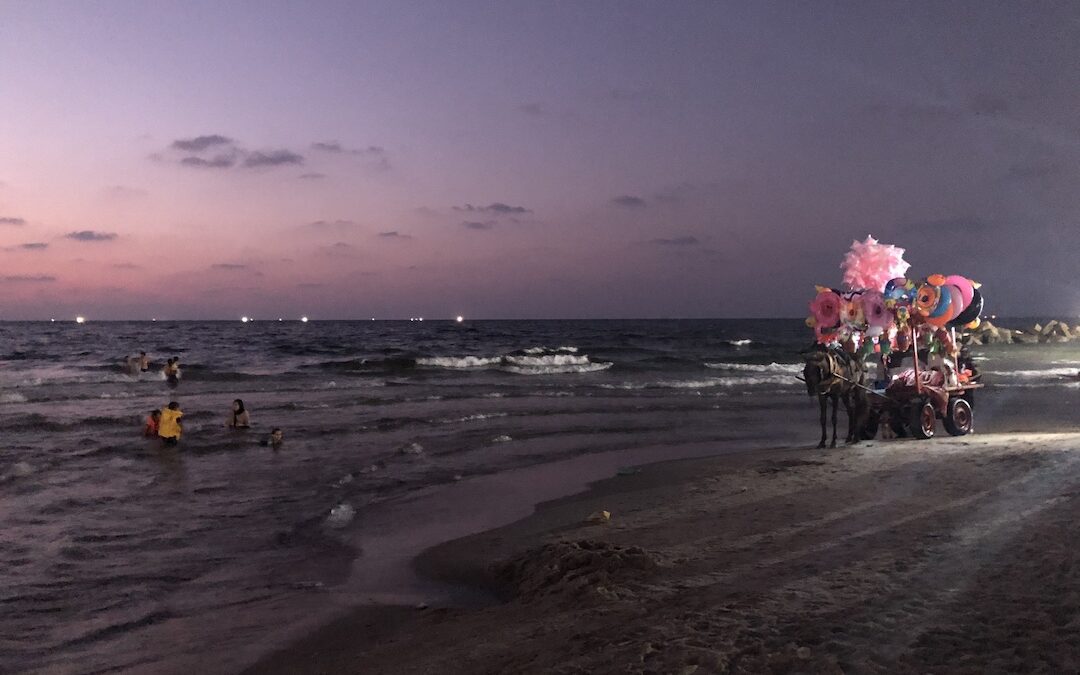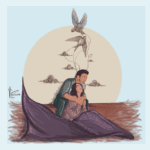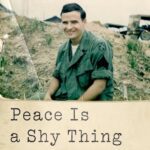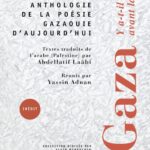Sunset in Gaza City, August, 2023 | Photo by author
Author’s Note: “Gaza by the Sea” was inspired by true events; the characters and plot line are fictional. The story was written in the summer of 2023, prior to the outbreak of the war in October. Since then, many of the landscapes it invokes—and the lives of the people inhabiting them—have been destroyed or transformed beyond recognition; the story cannot speak to this. It is also told through the eyes of an external observer; any inaccuracies are the author’s alone.
–
The sea is glistening in the rising morning sun, the light reflecting on the water’s surface the color of gold and emerald. The air smells of salt and fish and benzine. Elias has set off right after morning prayer, unfastening the tightropes that tied his boat to the wooden jetty and steering clear of the vessels anchored at port. Once he reaches the open sea, he prepares his nets and enters a new date in his logbook: 9th Sha’ban. The temperatures around this time of year are still bearable throughout the day, but soon the summer heat and humidity will slow life in Gaza. People and animals will seek shelter indoors from the scorching sun, only to emerge in the early morning hours or right before sunset. After dinner, families will gather by the beach to drink tea and talk and play games.
Life will appear peaceful, almost normal, until the next time the night sky lights up with the flashes of airstrikes, and the nightly tranquility is disrupted by the pounding of bombs.
Gaza was once a crossroads of civilizations, an important port for the spice trade. Its Grand Mosque, with arches and a minaret of stone, still exudes the grandeur of the past. Gaza is also a place of refuge, home to those unwanted in the desert and coastal plains of the south. They were driven to the far edge of the land, with nowhere to turn to but the ocean. And so, like thousands of Gaza residents, Elias learned the fishing trade from his father, who in turn learned it from his father.
While Elias is at sea that morning, time seems to stand still. There is just the rhythmic swashing of water against the bow, the contours of the coast in the distance. He closes his eyes and fastens his grip on the helm. He prays for a safe journey and bountiful catch, and to one day return to Al-Quds Al-Sharif, from where the Prophet, peace be upon him, ascended to the heavens.
Elias does not return home to his family that day. One fisherman who was at port swore to have seen navy ships; another surmised that Elias was seized by strong currents and taken far out to sea, from where return was impossible. There was no corpse to be washed and buried, no physical place to direct the grief.
***
Salma fastens the seatbelt of the Toyota Land Cruiser and takes a bottle of water out of the center console. The water is refrigerated, one of the perks of UN armored vehicles that she finds absurd in times of an acute funding shortage.
“How was your weekend?” she asks her colleague Tomas, who is driving. His family lives in Jerusalem—Gaza being a “hardship post”—and he spends most weekends with them.
“Good, thanks. Nothing special. Silvia and I had a dinner on Friday, and on Saturday we took the kids to the movies. But the theater is right by the Supreme Court. There were demonstrators everywhere.”
They leave Gaza City and speed along the main road to Khan Younis. Tomas overtakes a horse cart transporting gas canisters.
“I assume that the demonstrations were, once again, a sea of flags?” Salma asks, to fill the silence.
Tomas nods. “We also saw a few Kach party flags. They really stand out, all that yellow and black in a sea of blue and white.”
“Kahane? Jesus.” Salma slaps her forehead and takes a sip of water.
Tomas turns off the road into a residential neighborhood and stops outside a multistory building opposite a pharmacy whose logo features the Dome of the Rock. They are received by a slender man in his fifties, who lifts his left hand in greeting.
***
Salma was at university when her father called and told her about Sido Elias’s disappearance. She had not seen him in nine years, since the start of the blockade. Her first instinct was to conjure up an image of his face. The harder she tried, the more his features blurred and faded away, like ink on a page dissolving in water. Over the years, the contours reemerged and sharpened—the dark eyes, hollow cheeks, and graying beard—but an element of indeterminacy remained. Salma often wondered if she could recognize her grandfather in the street or identify the sound of his voice. Perhaps the image she retained was not an actual memory of him but a memory of the pictures in her mother’s photo albums, stacked neatly on the top row of the living room shelf: Elias as a toddler playing with a cat; Elias with his diploma at his graduation; Elias on holiday in Cairo; Elias with his children, Salma’s mother and Uncle Marwan and Aunt Fatima, at Fatima’s wedding in the US. The nature of the photographs changing with the lapse of the decades, from sepia to black and white and, starting from what Salma estimates to be the 1980s, to color.
***
“Good morning. My name is Tomas Halland from the protection team, and this is my colleague Salma Bishara,” Tomas says. “We are here to ask you a few questions as a follow-up to our conversation two months ago.”
Salma translates, trying to make the words sound personal, empathetic.
The man nods. He has dark circles under his eyes, which are puffed, and the rest of his face looks hollow, as if he were recovering from a prolonged illness.
Tomas takes out a notebook and starts asking questions about the family’s humanitarian situation. When was the last time they received food aid? What did they receive, and how much? Was it enough? Are his daughters still in school? He carefully writes down Salma’s translation of the answers in the notebook.
A woman wearing a gray headscarf with yellow flowers briefly emerges from the pharmacy and hands Tomas and Salma two small bottles of peach iced tea. “Islamu ideiki,” Salma says.
Tomas nods to the woman before resuming his questions.
“I have a note here that says your family receives support as part of the reconstruction program. Could you please tell us a bit about the most recent developments on this? When did you last receive the monthly disbursement?”
As Salma translates, she can see the man’s dark eyes widening and tears welling up.
***
With the passage of time, Elias has lived on as an unquiet ghost in the imagination of Salma’s family. At family gatherings, Salma’s mother insists on setting a place for him, even though her husband laments, half-jokingly and half-resigned, that it is black magic, devil’s work. After the meal, she will take the photo albums from the shelf and, like an archivist or a historian, carefully reconstruct Elias’s life right up to the morning of his disappearance. Then the ruminations will start.
He is gone because I didn’t call the evening before.
I should have visited Gaza that spring.
I troubled him so much when I was a child.
I should have warned him that the currents can be strong.
I should have made sure that he checked the engine before setting off.
When we moved to Europe, I neglected him. I was a terrible daughter.
I did not pray enough for his safety. I was ungrateful.
There are no words that can comfort Salma’s mother; the common denominator is always It is my fault that he died.
***
“They killed my son! They killed him! I had to pull him from under the rubble. He was playing with a balloon when the wall collapsed. What kind of country bombs a nine-year-old child? What did he do wrong in this world?”
Tomas looks on, then places a hand on the man’s shoulder. “I am so sorry for your loss.”
“My wife, she doesn’t leave the house except to go to the cemetery. She still talks to him, as if he were only sleeping and might awake at any moment. She brings baskets of fruit and sweets, and pen and paper for him to draw. He was so talented. He drew his sisters and our home and the mosque, but the most striking was his drawing of the sea. It was bright blue and full of boats and fish.” The man stops and takes a breath, wheezing. He wipes away his tears with the thumb and index finger of his right hand.
Tomas looks to Salma, seemingly unsure of the proper etiquette, the right words to console.
He has spent almost twenty years working in the humanitarian sector, first in Kosovo, then in East Timor and Iraq, where he stayed for seven years, even after his supervisor and four of his colleagues were killed in the bombing at UN headquarters. He’d known instinctively then that UN missions would never be the same, that something fundamental had shifted, like tectonic plates under the earth’s surface, invisible but deadly. Still, he’d stayed on, motivated by youthful idealism and a deep, almost spiritual belief in the blue flag. He’d fallen in love with Baghdad, with the palaces and palm trees lining the Tigris River, with the legends of Babylon and Mesopotamia. Before he knew it, he’d fallen in love again, this time with Silvia, who was working for the Swedish Ministry of Foreign Affairs at the time. Their courtship was brief, without much pretense or passion; they valued each other’s similar background, their common understanding of a shared world. That they were compatible in this way gave them certainty in times of turmoil, amidst curfews and roadblocks and near-daily attacks. When Silvia was pregnant with their first child, she’d insisted on relocating, so they swapped one occupation for another and moved to East Jerusalem.
Though he has carried his share of grief over the decades, it is in moments like this that Tomas feels woefully inadequate, for there remained an unbridgeable gap: for him, it was a choice to be here; he could leave at a moment’s notice, courtesy of his Swedish passport and his UN laissez-passer. In three weeks’ time, Tomas and Silvia and the children would travel through Ben Gurion Airport to Stockholm Arlanda. The children would sit by the window and look outside, their eyes opened wide with curiosity and a sense of wonder. With the plane gaining altitude, the coastline and landscapes below them would recede ever farther into the distance, like memories of a dream fading away.
***
Since Salma took the job at the UN agency, her mother’s commemorations have grown ever more urgent and feverish. There is a compulsion in her rituals, her drawing up of dates—birthdays and deaths and, of course, the disappearance—as if they held a clue, as if there were a secret code, a logical symmetry to the universe, that she only had to decipher. Salma feels that there is an expectation, subtle and unspoken but palpable whenever she talks to her parents about life in Gaza, to finally lift the shadow of ignorance, the veil of speculation. The burden, carried so long by her mother, like Atlas bearing the weight of the world on his shoulders, has shifted onto her.
Every time the topic comes up, Salma explains patiently that there is nowhere to turn to, that she cannot betray her personal grievances to either of the authorities. Too great the risk that her permit will be revoked or that she will be summoned for interrogation, though she is certain they already know.
“The social contract of authoritarian regimes: you pretend to govern, and I pretend to be obedient,” Salma says on one occasion. “You taught me this yourselves.”
***
Salma can feel herself tear up.
“May God rest his soul,” she says, looking at the floor. “May flowers bloom on his grave. May God wash away your tears and ease your suffering.”
The man nods and places a hand on his chest. Then he slowly shakes his head.
“Life has been stripped to the bone. Nothing remains but sleeping, eating, and praying. You are the United Nations, but you did not protect my family. I have nowhere to turn to but God.”
Salma hesitates for a moment. Then she says, “With hardship will come ease.”
***
On Saturday evening, before the start of the new workweek, Salma calls her parents from her apartment. The AC sputters and rattles, then turns off for a few seconds before the generator kicks in. Salma goes to sit on the balcony, which overlooks the sea. The summer air is still warm and humid. Her father picks up the phone.
“Salma, how are you? How was the weekend?”
“It was okay, I guess. I’m still recovering from last week.”
“What happened?”
“We spoke to a father whose son was killed. He was nine. These things never get easier.”
“May God have mercy on him.”
“The most difficult thing is not being able to offer any comfort. What can you really say to someone?”
“He should place his faith in God. Only God can deliver justice.”
“What if he doesn’t believe in God?”
“He should. Otherwise, it means that there’s only this world, which is full of misery, and that is something I cannot accept.”
“I wish I could see things from your perspective.”
“You will. One day all of this will end.”
“It sure doesn’t look that way.”
“I understand how you feel. Do you remember the story I told you of my great-uncle?”
Salma nods. “In Jordan? Yes.”
“He spent his whole life longing to return to the plains of Lydda. Whenever he saw a plane in the sky—these giant metal tubes that he couldn’t comprehend and never set foot on—he wondered if they would land at the new airport, built on the ruins of his hometown. Yet the day of return never came; God had other plans. So, he swallowed the bitter seed of exile, and when he died at the age of 88, he was buried with an olive branch from Lydda and the key to his old house. In death he could finally be reunited with the earth that raised him.”
Salma’s father is silent for an instant.
“One day, God sees to it that all our suffering comes to an end. If not here on earth, then in the other world.”
***
On the drive back to Gaza City, Salma and Tomas don’t speak for some time. Eventually, Tomas says, “In case you fancy some whiskey, I brought back a bottle. One of the privileges of not having to go through Erez.”
***
“Listen,” Salma’s father says abruptly, “Your mother wants to come visit.”
Salma covers her face with her left hand, clutching her phone with the other. “But that’s impossible…”
“Not via Israel. She wants to go to Sinai.”
Salma shakes her head. “She would have to go to the north, and the security situation is not safe there. Maybe there’s no full-blown insurgency anymore, but there are sporadic attacks. Plus, I cannot go to Egypt. They won’t let me pass through Rafah.”
“You talk to her yourself. I have already told her that I don’t see a way, but she insists. You know her.”
***
“The more you try to remember something, a person or an object or an event, the less accurate the recollection becomes. Human memory does not capture things accurately like a camera or a hard drive,” Leonie, Salma’s friend in Berlin, once told her. “You are actually creating new, different memories each time. That’s why eyewitness testimonies are considered to be rather unreliable. Especially the further back in time you go.”
In class, they had been discussing criminal procedure and evidence, and a famous trial about atrocity denial had come up. Several expert witnesses—including renowned historians—testified in court, but no eyewitnesses or survivors.
“I understand that,” Salma replied as they were leaving the Otto-Suhr-Institut, opening up their umbrellas to protect themselves against the November drizzle. “But can’t that be factored in? Shouldn’t it be more important to allow people to tell their story? Shouldn’t history also be about them?”
***
Salma leaves her apartment, crosses the main road, and heads to the beach. A few families are sitting in plastic chairs by the water, their chatter mixing with the sounds of traffic and the crashing waves. In the shallow water, there’s a horse and a cart with pink balloons attached to it, whose color matches the setting sun. The clouds look like cotton candy.
Salma finds an empty chair and sits down, waiting for her mother’s call.
“Salma, I’m here. In Rafah.”
“How was your journey?”
“It was fine, just long.”
“Salma dear, I am by the ocean.”
“Me too.”
“Salma, I see him. I see Sido Elias. Do you see him too?”
“Yes, Mama. I can see him.”
“Salma dear, please tell me what you see. Please describe him.”
“I can see him floating above the water. His eyes are how I remember them, the color of dark chocolate. He has aged since I last saw him. His hair and beard are white. He looks a bit lost, like the spice merchants of old with their camels who consulted the stars for direction.”
“Now he is turning towards us. I think he recognizes us. I can see his eyes light up. He is lifting a hand in greeting. He is smiling.”
Salma pauses for a moment, squints her eyes, and looks into the distance. The sun has now set. A half-moon and the first stars are visible against the night sky. The families around her are gone, leaving only a shovel and sandcastle and a few plastic bottles behind. Even traffic seems to have quieted down, and against the rhythmic swashing of the waves, Salma can hear her mother quietly weeping.
Anna-Christina Schmidl
Anna-Christina Schmidl is an international lawyer and writer from Germany.









This is beautifully written and captures so many of the heart rending experiences of the people of Gaza. Reading it now makes it even more profound and sad, as the genocide in Gaza continues.